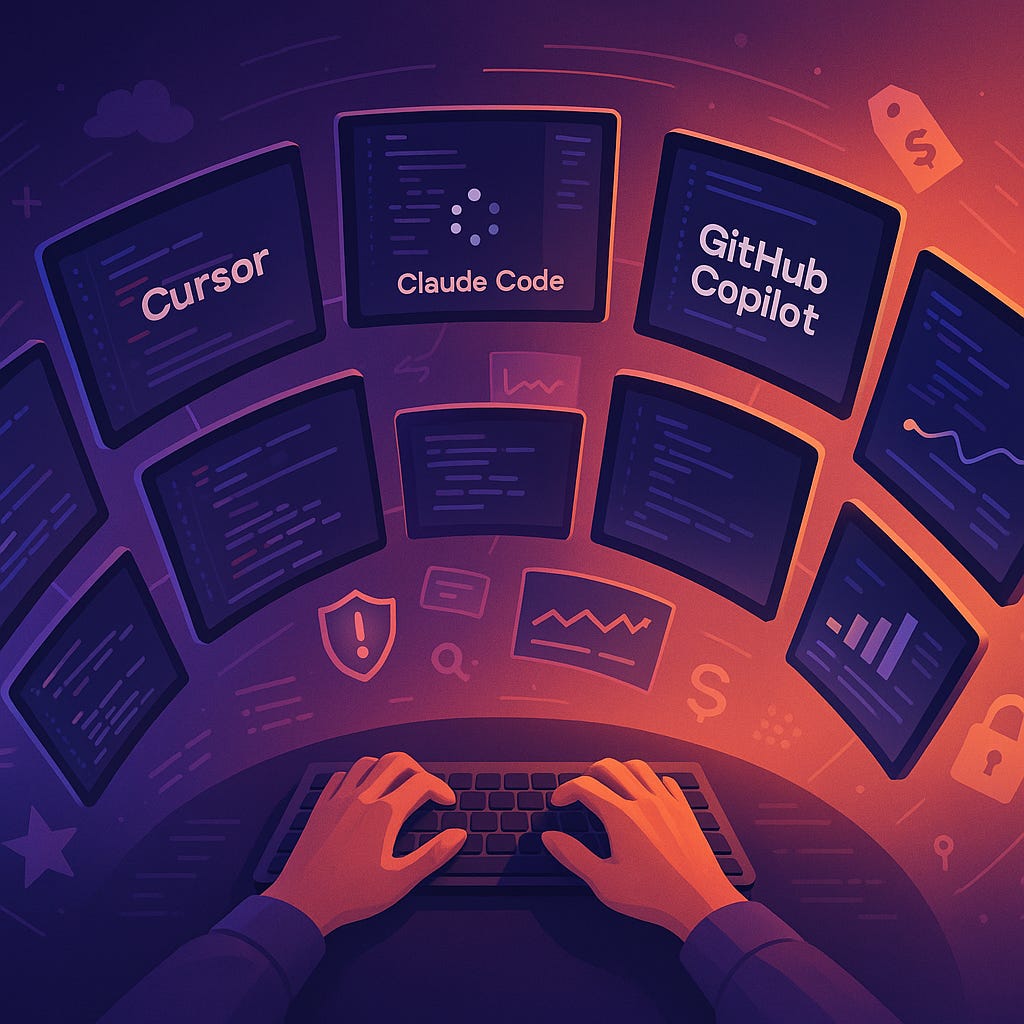Around the Horn: AI Coding Tools Reality Check
A quick sweep through what's actually happening in AI development tools—from weekend frustrations to surprising discoveries
When Your Primary Tool Lets You Down
Had one of those weekends. [Claude Code], which has been my reliable companion for months, decided to throw a series of curveballs that left me questioning whether I was the problem or the platform was having issues.
Some of it was definitely self-inflicted—I've been pushing harder on complex refactoring tasks, probably overloading contexts in ways that make any AI model struggle. But the slowdowns felt different this time. Responses taking longer, suggestions that seemed less contextually aware, the usual flow just... off.
It's a reminder that even the tools we've come to depend on have their rough patches. More importantly, it highlighted something I'd been thinking about: the value of having backup systems.
My Augment Code (Pleasant) Surprise
Which brings me to the weekend's silver lining. I fired up [Augment Code](https://augmentcode.com/)—I maintain the $50 developer plan as a backup—and was genuinely impressed. Not just that it worked without the hiccups I was experiencing elsewhere, but that it was *fast*. Notably faster than I remembered.
The [remote agents feature] proved particularly useful for documentation tasks. While I was wrestling with context issues in other tools, Augment Code's agents were quietly churning through documentation updates in the background. Sometimes the less flashy features turn out to be the most practical.
It's worth noting: when you have a very specific task—refactoring a particular module, generating focused documentation, cleaning up technical debt—sometimes a single, well-configured agent just works better than complex orchestration setups. Less coordination overhead, more direct execution.
The Security Reality Check
Speaking of reality checks, the security research coming out of 2025 should concern anyone building production systems with AI assistance. The [CVE-2025-54136] and the [CurXecute zero-click exploit] [CVE-2025-54135] aren't isolated incidents—they're symptoms of systemic issues.
The [Georgetown CSET study](https://cset.georgetown.edu/publication/ai-code-generation-security/) finding that 48% of AI-generated code contains security vulnerabilities isn't surprising if you've been paying attention. What's concerning is how readily we've accepted this as "normal" because the productivity gains feel immediate.
The numbers suggest we're essentially trading short-term velocity for long-term technical debt, with security being the primary casualty.
Cursor's Trust Implosion
The [Cursor] pricing controversy from June provides a textbook case in how to destroy developer goodwill. Moving from transparent credit-based pricing to opaque rate limiting, then requiring a $200/month Ultra plan for what users previously got for $20—it reads like a deliberate attempt to alienate your user base.
CEO Michael Truell's July apology
acknowledged the damage, but trust in developer tools is fragile. When developers feel "betrayed" (their word, not mine), they don't just switch tools—they warn others away.
The migration patterns tell the story: significant user movement to [Windsurf], renewed interest in [GitHub Copilot], and increased exploration of open source alternatives. Once you break that trust relationship, winning it back requires more than an apology.
The Rate Limit Reckoning
[Anthropic's August implementation of weekly rate limits] signals a broader industry reality: the economics of unlimited AI assistance don't work. Claude Pro users hitting limits "in a few messages" aren't edge cases—they're the inevitable result of infrastructure costs meeting user expectations.
The immediate user backlash and subscription cancellations demonstrate how quickly pricing changes can alter adoption patterns. It also shows a growing disconnect between how these tools are marketed (unlimited assistance) and how they're actually delivered (carefully managed resources).
Open Source Momentum
The open source alternatives are gaining serious traction. [Cline's] 48,000 GitHub stars and 2.7 million installations aren't just protest votes against commercial limitations—they represent genuine technical preference for transparency and control.
[Ollama's](https://ollama.ai/) trajectory to 150,396 GitHub stars and recognition as the [fastest-growing open source AI project suggests developer appetite for local deployment and data sovereignty. When Fortune 100 companies like [SAP] and [Samsung] publicly celebrate their Ollama deployments, it's a clear signal that enterprise buyers are prioritizing control over convenience.
The Productivity Paradox
One stat that really stood out: the [METR study] showing developers are actually 19% slower with AI tools, despite believing they're faster. This perception gap explains a lot about current market dynamics—tools that feel helpful may not actually improve outcomes, which also include over-hyped results and a shakeout in both what tools are used and more importantly how they're used.
Though I'll be digging into this study's methodology later this week. Something about the results feels off, and I'm curious whether the experimental conditions truly reflect how experienced developers actually use these tools in practice.
Though I'll be digging into this study's methodology later this week. Something about the results feels off, and I'm curious whether the experimental conditions truly reflect how experienced developers actually use these tools in practice.
The 84% usage rate despite declining satisfaction (from 43% to 33% in [Stack Overflow's survey] suggests we're in a classic adoption paradox: widespread usage driven by perceived benefits that don't match measured results.
What This Means for Development Teams
The pattern across all these developments points to market maturation. Initial enthusiasm is giving way to realistic assessment, and developers are becoming more judicious about when and how to deploy AI assistance.
The shift toward open source alternatives, emphasis on local deployment, and demand for transparent pricing represents evolution toward sustainable development practices. We're not rejecting AI assistance—we're learning to use it more effectively.
For individual developers, this suggests maintaining multiple tools and approaches rather than betting everything on a single platform. For teams, it means developing evaluation frameworks that measure actual productivity gains, not just perceived improvements.
The weekend reminder about backup systems applies broadly: in a rapidly evolving tool landscape, redundancy isn't just smart—it's essential for maintaining consistent development velocity.
*The AI coding tools market is maturing rapidly, with clear winners and losers emerging based on trust, transparency, and measurable value delivery. What I learned this weekend: the tools that actually work when you need them beat the tools that promise everything.*a



